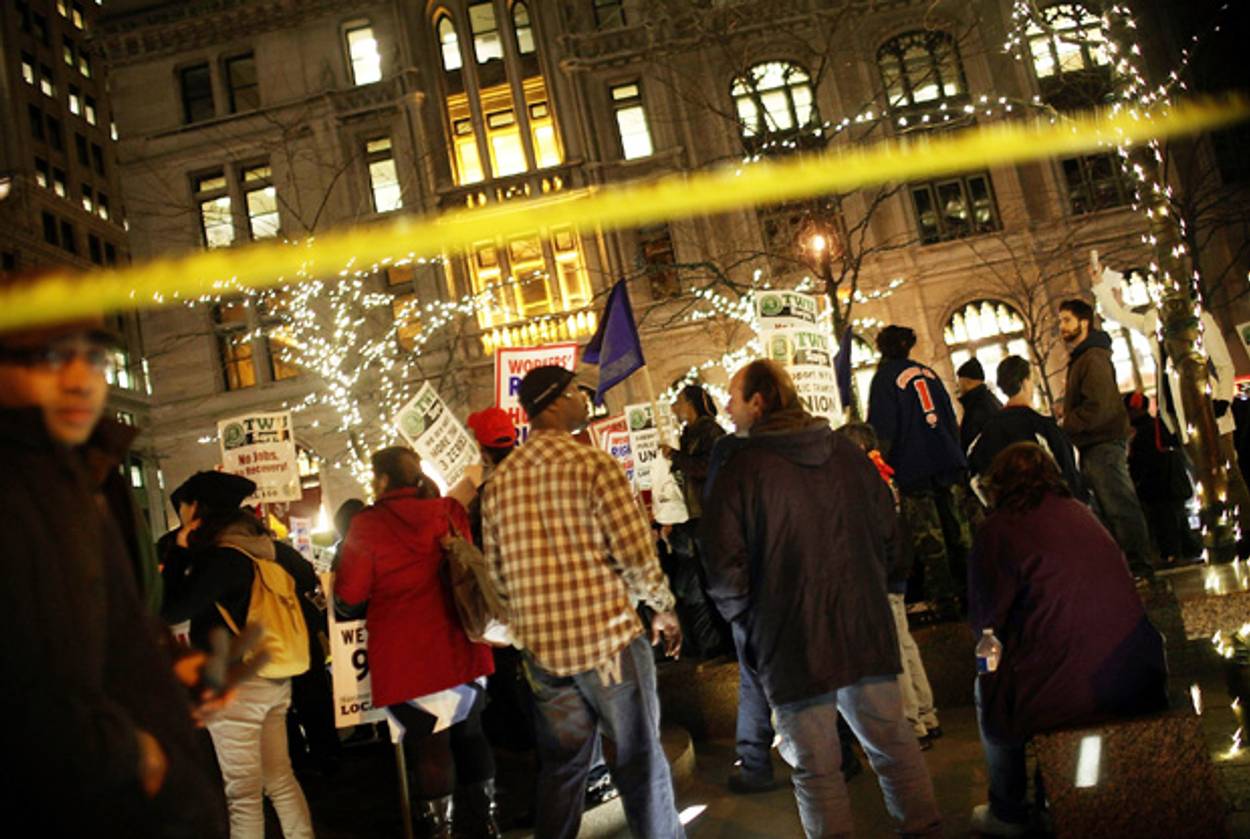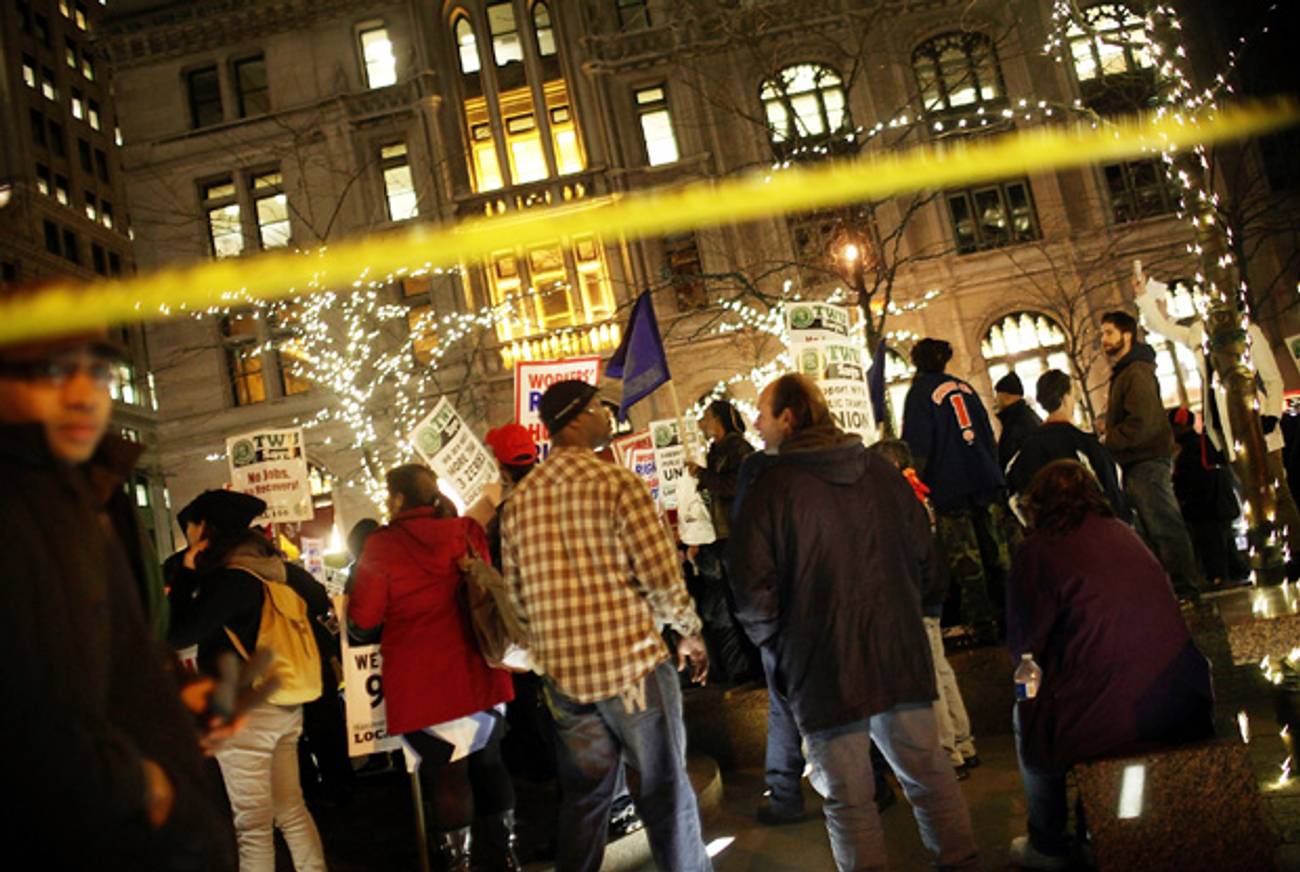How Jewish Is Occupy Wall Street?
Commenting on ‘Commentary’




Jonathan Neumann has a long, considered essay in the January Commentary about Occupy Wall Street. In one sense, that fact—and its prominent placement on the neoconservative journal’s Website—is victory enough for OWS: it has forced itself into just about every imaginable conversation at this point, and even Commentary has to reckon with it. Of course, that doesn’t mean Commentary has to agree with it, and, of course, it doesn’t.
Neumann makes the following arguments:
• That despite the efforts of supporters to “downplay” it, “anti-Jewish and anti-Israel hostility … was more prevalent than their initial denials suggested or their belated statements of concern conceded.”
• “Certainly, the Occupiers were more hostile toward Jews than toward any other ethnic or religious group. And certainly they were more hostile toward Israel than toward any other foreign state and more preoccupied with Israel than with any other foreign policy issue.”
• That Jews and Occupy Judaism were the most prominent religious groups affiliated with the protests, and in fact that, with Occupy Judaism’s building of a sukkah, it proved crucial to the movement’s evolution—after the Zuccotti Park sukkah was built, the police began to allow tents and other structures.
• That those Jews who opposed bringing Israel into OWS were motivated not by principle but by making the OWS tent as large as possible.
My first instinct is to be disappointed that Commentary has chosen to embrace only one strand of Judaism—the side obsessed with laws and authority (which very much exists)—while ignoring Judaism’s other, dialectical half: that of dissent and heresy. An honest reckoning with the outsize Jewish involvement in Occupy Wall Street (and Neumann sure is right about that) leaves Jews with much to feel proud of whether or not they support the movement. But the larger problem is Neumann’s failure to honestly consider what even he acknowledges are the movement’s core demands, which were economic.
There’s only so much re-hashing that can be done concerning the prevalence of anti-Semitism. The most notorious offensive sign-holder was a local crank. On the other hand, the OWS’ Boston iteration did indeed march on the Israeli consulate in solidarity with this year’s Gaza-bound flotilla, something which should have troubled all supporters of Israel (as it did me). Adbusters, the magazine that originally called for the occupation, is obsessed with Israel- and Jewish-centric conspiracy theories; but Adbusters did little other than originally call for the occupation—it had no presence or relevance on the ground.
As for those of us who didn’t want Israel to play a role in OWS because we wanted OWS to appeal to as many people as possible—and I say “those of us” because I am quoted as being such a person—I have to apologize for giving the impression that I was motivated primarily by realpolitik. The main reason I did not enjoy seeing certain OWS protests adopting an anti-Zionist agenda is because I saw neither the relevance nor the connection between anti-Zionism and OWS’s “1 percent message,” and I didn’t see the connection because I am in fact a Zionist who also supports OWS’s economic message. The two things, in other words, are not incompatible, as Neumann seems to suggest.
Were the occupiers “more hostile toward Jews than toward any other ethnic or religious group?” I’m not sure what Neumann is basing that on, especially since at the same time he points out (accurately) that Jews played a huge role in the movement (when New York reported on who the leaders of the ostensibly leaderless movement were, one couldn’t help but notice the cavalcade of Jewish names). Was it a cardboard cut-out of Lloyd Blankfein’s head on a pike? Yes. Is Lloyd Blankfein Jewish? Of course. Was Blankfein’s head on a pike because he is Jewish? No, it was there because he is the CEO of Goldman Sachs. Was Goldman chosen because it is the historically Jewish firm? No, it was chosen because it most successfully fleeced ordinary Americans while maintaining gigantic bonuses for its own employees during the run-up to and aftermath of the 2008 crash. Was Goldman uniquely “good” because it’s the historically Jewish firm? Well, maybe, and that’s where this gets more complicated.
Perhaps the sentence of Neumann’s that most tripped me up came early on. “To begin with,” he wrote, “any conspiracy theory that connects a tiny portion (in this case 1 percent) of the population with exploitative banking practices is susceptible to taking on anti-Semitic undertones.” I suppose that’s technically true, but in fact, a cursory and honest look at the news of the past few years reveals radical and radically increasing income inequality, fueled in large measure by exploitative banking practices enabled by Washington and gleefully utilized by Wall Street. And a cursory and honest look at Jewish history reveals that the same traits that inevitably put Jews at the forefront of protest movements like Occupy Wall Street also put them in positions high atop the government and financial system.
Neumann looks at the important role of the sukkah in advancing the movement and sees perfidy. I see the Jews, yet again, serving as the vanguard of an honorable movement for social justice. This gets tricky: Neumann is asking us to focus on the indelible Jewishness of the bankers and to ignore the indelible Jewishness (or at least its positive aspects) of the protesters; I am asking you to focus on the indelible Jewishness of the protesters—the organizational acumen, the passion for social justice, the activist genius—and ignore the indelible Jewishness of Blankfein and Bernanke (or, even worse, implying they are shandas or some such). And suddenly this comparably small dispute over whose OWS narrative best reflects reality has become an argument over what Jewishness is.
So let’s stick to facts. I’m a supporter of Occupy Wall Street who has acknowledged and condemned (and also gone out of my way to report on) the relatively marginal elements that have tried to turn it into an anti-Zionist thing. Neumann, by contrast, is magnifying the marginal elements at the expense of what even he admits is the movement’s main thrust: calling attention to debilitating wealth inequality in the United States. Commentary and Neumann owe us a fuller explanation of how they feel about this inequality. Do they deny it exists? Assuming they don’t (and how could they?), do they believe that it’s okay—that it’s simply the free market sorting out the winners and losers—or do they think it should be addressed by people in power?
And, sure: do they think there is something fundamentally un-Jewish about it? Neumann begins his article with Occupy Judaism’s Kol Nidrei service and its call for a “fast from your capitalist lifestyle.” But he fails to print the actual quotation that was read that night, not just across the street from Zuccotti Park but in thousands of synagogues around the world: “Is such the fast I desire,” the Lord asks in Isaiah,
A day for men to starve their bodies? Is it bowing the head like a bulrush and lying in sackcloth and ashes? Do you call that a fast, a day when the Lord is favorable? No, this is the fast I desire: To unlock the fetters of wickedness, and untie the cords of the yoke. To let the oppressed go free; to break off every yoke. It is to share your bread with the hungry, and to take the wretched poor into your home; when you see the naked, to clothe him, and not to ignore your own kin.
You simply can’t seriously argue that a message of social justice was bizarrely shoehorned in to Judaism’s holiest night. It’s right there.
Occupy Wall Street and the Jews [Commentary]
Related: Busted [Tablet Magazine]
2012=1968? [NY Mag]
Earlier: Is Occupy Wall Street Anti-Semitic?
The Problem With OWS’ Palestine Affiliation
Busting the ‘Adbusters’ OWS Story
The Pro-Palestinian OWS Offshoot
Atonement in Lower Manhattan
Marc Tracy is a staff writer at The New Republic, and was previously a staff writer at Tablet. He tweets @marcatracy.